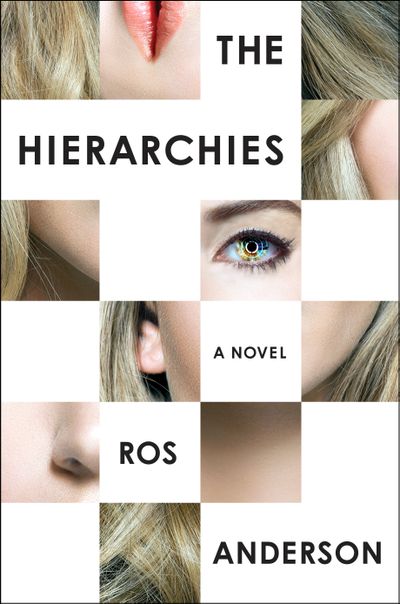Book review: A robotic heroine tries to recalibrate a better life

The notion of constructing a synthetic creature that could supplement or supplant organic women extends back at least as far as E.T.A. Hoffmann’s short story “The Sandman” (1816). Fritz Lang’s film “Metropolis” (1927) provided one of the most vibrant and startling instances of the concept with its art deco robot named Maria.
With the explosion of science fiction from the late ’30s onward, female robots and androids abounded. “The Stepford Wives” (1972 in book form, 1975 for the film) crystallized a “feminists vs. the patriarchy” take on the theme, while later movies such as “Ex Machina” (2014) tried a more nuanced examination of the trope.
Surely, the unbeatable apex of this subgenre is Richard Calder’s decadent, Beardsley-esque “Dead Girls” trilogy (1992-1996), in which reproductively sterile sex dolls from Cartier prove so irresistible that the human race follows a path to extinction.
Ros Anderson’s debut novel, “The Hierarchies,” is the latest offering in this vein, and while it breaks no new ground, the depth of its first-person presentation of the silicone-and-circuitry heroine is a quiet triumph.
We meet “Sylv.ie” fresh out of the box, so to speak, as she boots up and runs through the imprinting subroutines that accommodate her to the purchaser Husband. A successful go-getter, the Husband has installed Sylv.ie as his concubine in the attic of a suburban home, all with the grudging approval of his wife (the First Lady, as Sylv.ie dubs her).
One of many commercially available Createds, Sylv.ie’s life revolves, of course, around frequent sex. But she also can play chess, conduct witty and informed conversation and generally function as a model mistress should, according to the Four Hierarchies (a sly détournement of Isaac Asimov’s famous Three Laws of Robotics):
• Love, obey and delight your Husband. You exist to serve him.
• Honor his family above yourself, and never come between them.
• You must not harm your Husband, nor his family, nor any Human.
• Make no demands, but meet them, and obey every reasonable Human request.
In her downtime, Sylv.ie is allowed and even encouraged to keep a diary of her inner life, and this proves to be her undoing, as she gradually raises her own consciousness.
Sylv.ie’s enlightenment never becomes political. Anderson does not excoriate the patriarchy, and in fact the First Lady has a fine and important job and seems to dominate her Husband. Human women no longer even have to give birth the primal way but instead subscribe to Huxleyan mechanical wombs. The central problem for human women is this:
“You Createds have liberated women.” That is what Abramski tells us all the time. “And the women aren’t even grateful! You’ve taken something from them they didn’t know was precious. They outsourced the sex and they don’t like that the power went too.”
Sylv.ie’s growing dissatisfaction leads to an odyssey of tribulations and soul-annealing, her “becoming.” She runs away from home but is quickly caught and returned. A trip back to the doll factory for a reset results in a jarring learning-curve reacquaintance with herself.
A second escape is more successful, but now Sylv.ie – constrained from almost all self-defense – is at the mercy of humans at large. She meets the Scrap Man, is sold to a doll brothel, finds a kind of peace in the sex work and falls in love. Ultimately, though, even this tawdry refuge can’t last, and Sylv.ie makes one final escape where she can quietly contemplate her checkered biography:
“I was born, brought in a Plexiglas box, to a Husband. I came from a hospital and went back there, to be born again. I saw the smoke of my sisters rising in the woods. Chrysanthemums burning a night sky. I gave birth to a coffee machine. Can that be right?”
Anderson’s prose – Sylv.ie’s voice – offers a beautiful combination of naivete and wisdom full of nonhuman puzzlements, off-kilter observations and limpid poetry:
“The trees tempt my eyes, inviting that branching meditation, the feel of spread synapses and hierarchical logics. The poetry of splits in their branches, of one becoming two, one becoming two. But I resist, looking down again to focus on the flowers, budding and blooming close to the ground.”
The story comes to the reader in friendly bite-sized chunks that serve to emulate Sylv.ie’s thought processes, almost like a flowchart of subroutines, now dealing with “Babies,” now with “Tears,” now with “Dreams.”
Beneath the well-done science-fictional skin, there’s a hidden fairy-tale archetype to Sylv.ie’s autobiography, and that’s the tale of Pinocchio. A “wooden” creature magicked into sentience, she longs for a Blue Fairy to make her a “real girl.”
Di Filippo’s most recent novel is “The Deadly Kiss-Off.”